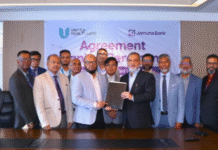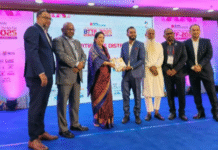TBS

Highlights:
- Kaliakair Hi-Tech Park drives Bangladesh’s digital industrial transformation
- Investments exceed $800 million from 50 local and foreign firms
- 34 companies operate; employment to reach 50,000 when complete
- Major players include Hyundai, Xiaomi, Walton, and Bangla Cars
- Power, customs, and tax policies remain key investor challenges
- Park expected to boost exports and ensure national data sovereignty
Located on the northern edge of Gazipur, the Kaliakair Hi-Tech Park has emerged as the beating heart of Bangladesh’s new industrial era and technological transformation, drawing a surge of investments that are reshaping the country’s digital ambitions.
The concept of the park was first discussed in July 1999 during a meeting of the Bangladesh Investment Board chaired by the then prime minister. The aim was to build a technology-driven manufacturing base that could propel the nation into the digital economy.
More than two decades later, that vision has taken shape.
Since the political shift in August 2024, the hi-tech park has received $64 million in new proposals from local and foreign companies, with total investments now surpassing $800 million from 50 firms.
Once a muddy government project, the 355-acre site, managed by the Bangladesh Hi-Tech Park Authority (BHTPA), has now become one of South Asia’s fastest-growing hubs for electronics, information technology, and data infrastructure.
Speaking to The Business Standard recently, Faiz Ahmad Taiyeb, special assistant to the chief adviser, said three more foreign companies have shown interest in setting up factories in the park, and the government is considering their proposals.
He, however, did not disclose their names, saying, “We are at the initial stage of discussions with potential investors.”
Already, 34 companies are in operation, employing over 3,000 people. Once fully functional, that number is expected to reach 50,000, according to BHTPA officials.
To ensure a steady supply of skilled manpower, the Ministry of Commerce is also building a dedicated training institute within the park.
Among the active firms are Hyundai, which has started assembling cars, and Xiaomi, which produces smartphones. Walton Hi-Tech Industries Ltd is developing a $100 million factory, while Bangla Cars, the country’s first local electric vehicle brand, is constructing its own EV plant.
Daffodil Computers has set up a facility to manufacture computer components, and a Japanese company is building a factory to produce credit and debit cards – a move that will reduce the need for imports.
At the park’s digital core, Bangladesh Data Center Company Ltd and Felicity IDC are managing critical cloud and data storage operations.
The largest project under development – a $200 million Tier-IV data centre by the US-based Osiris Group and Hong Kong’s Jatra International Pvt Ltd – will be the first of its kind in Bangladesh, securing the nation’s data sovereignty by keeping cloud storage local.

Nearing full capacity
During a recent visit, the park’s transformation was clear. The internal road network is complete, and six industrial blocks now host a mix of assembly lines, data hubs, and R&D centres.
Three deep pump stations supply groundwater to factories through internal pipelines. Two substations are active, and another 20MW facility is under construction to ensure uninterrupted power.
According to Rakibul Hasan, project director of Kaliakair Hi-Tech Park, all 50 industrial plots have already been allocated, bringing the park close to full capacity.
“Currently, 34 companies are operational, employing about 3,000 people,” he told TBS. “Another 14 factories are under construction, while 16 companies are waiting to start building – most are stuck with power approvals, design clearance, or financing delays.”
He added that there are no vacant plots for new investors. However, four new firms were recently approved and will soon receive land. “The next expansion will come from plots reclaimed from Summit Technopolis Ltd and Bangladesh Technocity Ltd,” he said.
At the early stage of the park, Summit had built a 165,000 sq ft signature building, a 60,000 sq ft industrial block, and facilities for biotech and mobile manufacturing. Bangladesh Technocity developed over 313,000 sq ft of industrial and office space, including the eight-storey Solaris Building.
“We are working on recovering some unutilised land from companies leased earlier,” Taiyeb said.
“One company has already given written assurance to return part of its land. Once they are recovered, we will be able to accommodate more factories showing interest,” he added.
According to Taiyeb, the surge in occupancy reflects the private sector’s growing confidence in Bangladesh’s digital industrialisation.
Growing ecosystem of investors
According to the project director, the park currently hosts 34 active companies in electronics, IT, and R&D.
Fair Technology Ltd has invested $15 million in manufacturing and expansion, while Leo ICT Cables Ltd operates a fibre optic cable plant with $3.8 million. Golden International BD Ltd produces consumer electronics with $3.53 million, and Sonar Bangla Foundation BD, specialising in medical devices, invested $2 million.
EATL Innovation Hub Ltd, with $10 million, focuses on research and innovation. RedDot Digital Ltd and Daffodil Computers Ltd have invested $2.6 million and $3 million, respectively.
In total, companies in operation have already realised more than $300 million in investment, transforming the park from a concept into a functioning industrial ecosystem.
Another $270 million is tied to factories under construction. This includes Smart Hi-Tech Industries Ltd’s $12 million, Alu Hi-Tech Industries Ltd’s (a foreign investor) $100 million facility, and Export Competitiveness for Jobs (EC4J) project which is worth $118 million.
A further $270 million in planned investments is at the design stage, with firms such as Walton Hi-Tech Industries, Global Brand Pvt Ltd, and South Korea’s KONA Software Lab Ltd now finalising their project plans.
Early-stage projects in land development, including A to Z Engineering Works and Bangla Cars, represent an additional $25-30 million.
Power and policy bottlenecks
Despite its progress, the park faces growing challenges. Power demand is expected to exceed 40MW, with some factories requiring up to 5MW each.
Policy issues also persist. Investors have also raised concerns about customs delays and high import duties on raw materials. Companies including Daffodil Computers, BD Software and Security Systems, Alu Hi-Tech, and Whiteshell Ltd have urged the National Board of Revenue (NBR) to modernise tax structures and bonded warehouse policies to align with regional competitors such as Vietnam and Malaysia.
Admitting the policy bottlenecks, Taiyeb told TBS that the park’s authority has written to the NBR to resolve customs policy issues, including reassigning HS codes so investors can import equipment without hassle.
“We are trying to support the tech industries that are doing well in Bangladesh, like battery manufacturing, cloud processing, GPU, semiconductor design, and AI,” he added. “We have urged the NBR to ease tax policies for frontier technologies to help them grow.”
He said, “We are going through the Fourth Industrial Revolution, dominated by Artificial Intelligence. If we miss the train, we will be on the losing side.”
Kaliakair’s progress aligns with Bangladesh’s $118 million Export Competitiveness for Jobs (EC4J) initiative, which focuses on developing high-skilled digital employment.
Joint ventures with foreign partners, including IT Hub Industries Ltd (Bangladesh-USA) and KONA Software Lab Ltd (South Korea) – are helping build an export-oriented R&D base.
Industry experts say the park is becoming a self-sustaining ecosystem that could significantly reduce Bangladesh’s reliance on imported electronics and foreign data storage. Once fully operational, it is expected to emerge as a major source of tech exports and digital services.
Himan Mazumder, manager of Felicity IDC Data Center, said, “We have potential. Now we need to focus on growing our own tech industry to become self-reliant.”
The park isn’t just building hardware, it’s building a new kind of economy, industry experts noted.









